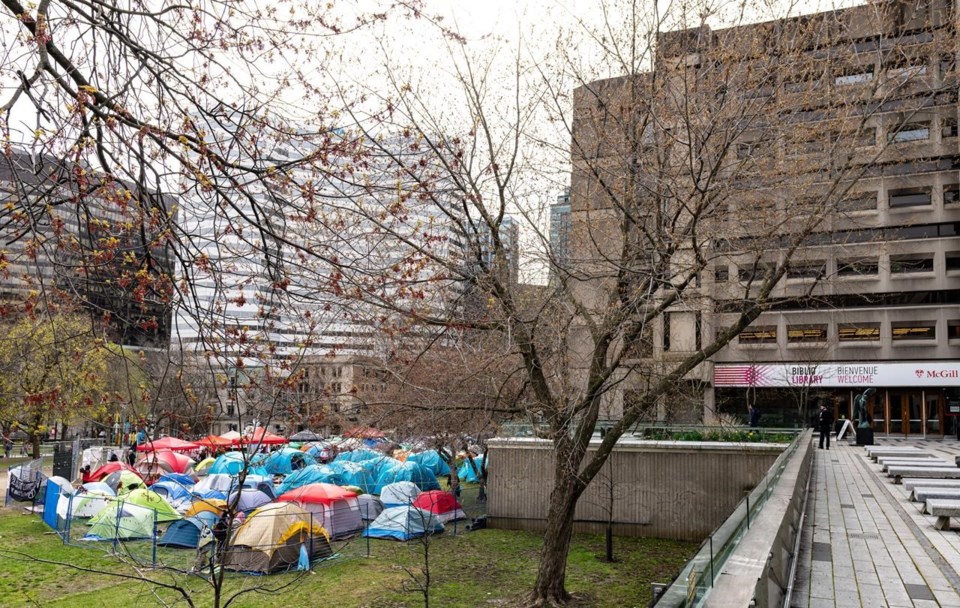MONTREAL ŌĆö Pro-Palestinian activists have set up protest camps at McGill and a small number of other 91įŁ┤┤ universities, following a wave of action seen at U.S. campuses.
The protesters are calling for an end to the war in Gaza, which was sparked by HamasŌĆÖ Oct. 7 attack in southern Israel that killed 1,200 people, mostly civilians.┬Ā
The calls come as IsraelŌĆÖs retaliatory assault on Hamas has killed more than 34,000 people, according to health authorities in Gaza.┬Ā
As the death toll mounts, some protesters have called for universities to divest any financial holdings in companies linked to the war effort, while others have gone further to call for schools to cut ties with any companies linked to the country.
HereŌĆÖs a look at some of the key questions around the divestment demands.
What are protesters calling for McGill to do?
There are a range of demands, but some are calling for the university to boycott and divest from companies ŌĆ£funding Israeli genocide and apartheid.ŌĆØ The protest camps have echoed calls made for months by some students, who have also carried out hunger strikes to push their demands.┬Ā
McGill has said many of the activists in the camps are not members of the school community and that it had seen video of some people using "unequivocally antisemitic language and intimidating behaviour."┬Ā
What kind of companies do they consider fall within this scope?┬Ā
Groups called McGill Hunger Strike for Palestine and Students for Justice in Palestine have put out a list of companies they want the university to sell its holdings in. These include international weapons manufacturers Lockheed Martin, BAE Systems, Thales SA and Safran SA, which they say have either supplied Israeli forces or have profited from the war.
The list also includes companies that they say provide other supplies such as communications equipment and fuel to the Israeli military, and companies that have operations in occupied territory.┬Ā
It also includes several big 91įŁ┤┤ banks, targeted because of their apparent holdings in weapons manufacturers; 91įŁ┤┤ grocers that sell Israeli products; and companies that have expanded into the country, or plan to, including Shake Shack, Open Text Corp. and Johnson & Johnson.┬Ā
What has been McGill's response?
McGill said in a statement that it doesn't invest directly in individual stocks or companies and instead relies on fund managers to choose investments. The school says that to ensure these investments are consistent with its sustainability and social responsibility, it selects fund managers based on criteria including reputation, risk and adherence to environmental, social and governance principles.
The school also said two members of McGill's senior management team met with a group of students who support Palestine on April 12. It says the staff listened to the students, and informed the group they could raise concerns about divestment through the university's established processes. It says, so far, the committee that reviews these matters at McGill has received no expression of concern on this topic.┬Ā
What kind of financial significance would there be to a divestment?┬Ā
Selling off weapons manufacturers would largely be a symbolic move, as the universityŌĆÖs holdings are relatively small. McGillŌĆÖs total endowment was about $2 billion as of the end of 2023.
Its disclosed investments include about $1.6 million in Safran, $1.3 million in Thales, $1.1 million in BAE Systems and $520,000 in Lockheed Martin Corp.┬Ā
The campaigners say they want McGill to sell off about $73 million in stock when all companies on the list are included, though almost a third of that total is made up of holdings in 91įŁ┤┤ banks.┬Ā
Is there precedence for this kind of divestment?┬Ā
Universities, including McGill, did in the 1980s sell off holdings in companies that were doing business in apartheid South Africa, as a way to pressure the countryŌĆÖs government.
More recently in December, after years of student campaigning, McGill committed to divest from fossil fuels. The university says it will sell off any holdings it has in the world's 100 biggest coal and 100 biggest oil and gas public companies by 2025.
The move follows commitments by many other universities and investment funds to sell off their oil and gas holdings as a way to reduce funding for new projects, and demonstrate their opposition to the companies' products.
Do funds ever specifically exclude arms manufacturers?┬Ā
While McGill maintains it doesn't specifically choose stocks or companies,there are many funds that screen out categories of investments like weapons makers, along with categories like tobacco, gambling and pornography. McGillŌĆÖs endowment doesnŌĆÖt have specific filters, though it does promote to McGill donors a fund that screens out fossil fuels.
The endowment does have $2.4 million invested in Desautels Capital Management, an investment firm owned by the university and run by students. All holdings in the fund must be negatively screened for a range of sectors, among which is armament manufacturing.┬Ā
The calls also come as a range of environmental, social and governance policies take greater prominence in investment. The university formalized ESG considerations in its investment process in 2020, a move it said sends a clear message on the importance of such factors.
In December, the university also committed to "regularly" reviewing its socially responsible investing initiatives. The next review has been scheduled for 2029.
This report by The 91įŁ┤┤ Press was first published April 30, 2024.
Ian Bickis, The 91įŁ┤┤ Press



